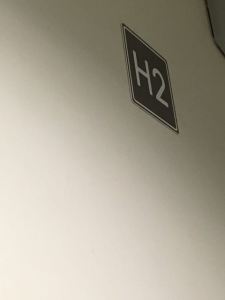 There we sat, at the spot labeled H2.
There we sat, at the spot labeled H2.
Had I thought of it, I would have pulled out a Sharpie and added an “O” when nobody was looking.
Which was most of the time.
My Emergency Room experience with my daughter was so different from my ER experiences with my father. He is a former physician, a former director of a department in that hospital, a long time staff member, a former trustee of the hospital. She was a 16 year old year with a bellyache.
A literal bellyache.
I was the one who felt like bellyaching, though.
When we reached the 6 hour mark, I began mentally writing a letter to the director of the hospital.
He had once given me his card and invited me to contact him anytime.
Of course, that was when I was there with my father.
On this day, though, I was there with my daughter. We were first placed in a room, then moved to the hallway (H2) because they needed the monitors in the room for another patient, then finally, near the end of our 8+ hours, moved back into a different room.
We watched/listened to the parade of other patients: the little girl who had been bitten in the face by a dog, the teenager wearing sunglasses and a hoody who was hearing voices, the diabetic who began removing his own IV, the little Captain America guy with a cough, the person who overdosed on prescription medicine, and so on. Emergency Rooms are busy places. I get that.
At high tide, lots of people were in hallway beds and chairs.
At low tide, we were the last to be moved out of the hallway.
We waited.
And waited.
And waited.
I wished someone would occasionally stop by and say, “I know you’re still here. We’re working on (fill-in-the-blank). But, of course, no one did.
And I think that was the biggest difference between when I’m at the ER with my father and when I’m there with my daughter — the communication. With him, we are always kept well-informed. With her, I had to seek out nurses for nearly everything.
When she vomited, other than handing her a cup and a tissue, no one came. No one stopped by to ask how she was feeling. No one took the cup full of vomitus. We were invisible.
I was worried about leaving my father home all day. Some days he is so unsteady. Some days he is so confused. Some days, the two walk hand-in-hand.
I spoke with my father’s pastor while I was at the ER, telling her we might need help, but sometimes she just doesn’t get it. I needed help then, but she was two days down the road.
I messaged my brother so he would check on my father. Unfortunately his schedule never allowed him to.
I messaged my 12 year old daughter who was home with him so she could fix him lunch. She did.
I kept thinking, we’ll know more soon. We’ll be heading home soon — or we’ll be heading to surgery soon.
But the waiting. The waiting seemed interminable.
Finally, I told them that I was a caregiver. I needed them to start moving.
Even then the wheels turned slowly.
Please understand, I don’t hate hospitals. This particular hospital has been intertwined with my life for nearly 50 years. My father worked there. My husband worked there. Many other family members have worked there. My children have been born there and my mother died there.
But at the crux of most problems is communication – – or lack thereof. And that was yesterday’s main issue.
I don’t mind waiting. My daughter wasn’t dying. Other people may have been.
Just let me know that we haven’t been forgotten.
We were finally sent home with a we-don’t-know-but-come-back-if-anything-changes.
She’s still not able to eat.
What are my alternatives?
